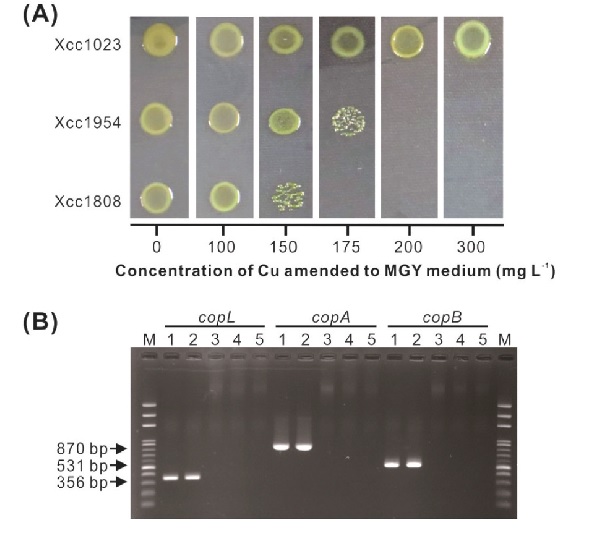All issues

Author:Ching-Yi Lin* and Hui-Ju Lin
Abstract:
Citrus canker caused by Xanthomonas citri subsp. citri (Xcc) is one of the most economically important bacterial disease in the international citrus industry. The copper-based bactericides were widely use to or control citrus canker. However, frequent applications of copper-based bactericides induce the development of bacterial strains either resistant or tolerant to copper. In this study, Xcc strains were collected from citrus orchards in Yunlin and Chiayi of Taiwan and used to assess the sensitivity to copper on a solid medium. The tests identified two copper resistant strains and 46 copper tolerant strains. Copper resistance in plant pathogenic bacteria contributes to a failure to control plant bacterial diseases by copper bactericides. In view of this, it is necessary to develop alternative control methods for sustainable agricultural practices. In this study, the individual and combined effects of acibenzolar-S-methyl (ASM) and 4-4 bordeaux mixture (Bor) were investigated in a greenhouse to control citrus canker disease. Three treatments were conducted on potted lemon (Citrus limon) seedlings: soil drench with 5 mg a.i. ASM, foliar spray with Bor, and a combination of the above two treatments (ASM + Bor). The lemon seedlings were inoculated with Xcc 3 d post treatments. The results showed that the disease severities of ASM, Bor and ASM + Bor were 19.14%, 15.0%, and 15.4%, respectively, which were significantly different from the untreated control (39.96%). For the defence-related enzyme activity assay, progressive increases in peroxidase and catalase activities were found in lemon seedlings treated with ASM alone. Our results suggested that ASM was effective in reducing canker disease severity, mainly through enhancing the activities of peroxidase and catalase in planta.
Key words:Acibenzolar-S-methyl, Citrus, Citrus canker
Download:![]() PDF Links
PDF Links
- 1. Development of Tractor-Mounted Seedling Transplanter for Sweet Potato
- 2. Synergistic Effect of Additional Gas on the Toxicity of Phosphine to Sitophilus oryzae and Sitophilus zeamais (Coleoptera: Dryophthoridae)
- 3. Effects of Temperature and Solar Radiation on Growth Traits and Plant Elements in Purple Leafy Sweet Potato
 Submit your manuscript
Submit your manuscript
 Guide for authors
Guide for authors